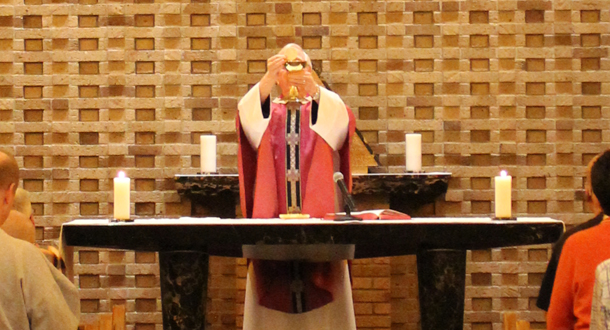
The Most Holy Body and Blood of Christ
Scripture:
Exodus 24:3-8
Hebrews 9:11-15
Mark 14:12-16, 22-26
Reflection:
During the pandemic lock down my wife and I, like everyone else, worshiped in front of our computer. No matter how beautiful the music or how inspiring the homilist, not physically being with our fellow parishioners, not chewing the Eucharistic bread, left us unsatisfied.
As Catholics, the “source and summit” of our faith experience is the Mass. Unless we are adult converts, all of us grew up with the weekly ritual. With its words so familiar, it easily became routine, even boring…especially during our teen years.
Fasting from the in-person experience of the Mass during the pandemic may have had an unexpected benefit: paying more attention to what we do at the sacred liturgy. Perhaps its absence made our hearts grow fonder of how transformative the Mass is.
In his highly acclaimed book Eucharist and Torture, Catholic Theologian William Cavanaugh makes the point that in Eucharist we are lifted up from the world and given a foretaste of the heavenly kingdom. We become the body of Christ in the Eucharist.
But what exactly does the Eucharistic celebration do to transform us?
If, in the liturgy, we listen to God speaking to us in the reading of the Word, we respond, at the offertory, by surrendering our entire lives to God’s providence. And what is God’s response to our offering? God takes us, unites us and changes us into the body of Christ. We, then, the Body of Christ, are offered to the Father to be at His disposal.
Reflecting on this awesome mystery can take us into a mystical state, which is always dangerous. Why? Because deep prayer, deep connection to God in mysticism always us leads to resistance. We become a public, collective protest against all that is counter to God’s will.
In today’s world sin is on display every minute, especially with the explosion of social media. Street violence, domestic violence, wars, torture, oppression, racism, lies, greed, sexual exploitation, neglect and abuse of children, drug and alcohol abuse, environmental destruction surround us constantly. It is too much to absorb or understand. Part of us wants to just escape all of it, to hide away in comfort zones of entertainment, sports, consumerism or other means that can be, in their extremes, self-delusional.
But as Catholics by God’s grace, we can respond to sin with the most powerful antidote: our collective cry in the Eucharist for unity that is found only in Christ. When we gather around the altar it is a public display of all our hopes, all our dreams, all our ambitions for a world ruled by forgiveness and love. A world as God wills it to be. We, collectively, literally consume Christ as a community. The Eucharist is not a refuge; it is a rallying call, a challenge, to go into the world and transform it as we have been transformed in our communal celebration.
We take into our worlds…our homes, neighborhoods, schools, ball fields, workplaces, marketplaces, vacation spots… something people sorely need: love and raw truth. These are radical, out of mainstream. In some situations, we will be laughed at, shunned, shamed. In rare cases we will be tortured and killed.
St. Oscar Romero, the El Salvadorian archbishop, let the Eucharist transform him while his country endured a destructive civil war in the 1980s. He spoke out against the violence and against the U.S. backed military that tortured and murdered thousands of innocent people, including some of his dear fellow priests. On the morning a lone sniper pierced the archbishop’s heart, the prelate stood at the altar in the little hospital chapel saying Mass for some sisters. During this transformative liturgy…all liturgies are transformative…he raised the host in protest against all the sin and sadness that surrounded him and his people. A single bullet splattered his blood on the altar and the sacred host.
He witnessed the ultimate price we all commit to paying each time we pray the Mass and receive the Eucharist.
May God give us the grace we need to live what the Eucharist is.
Jim Wayne is a board member of the Passionist Solidarity Network (PSN), and author of The Unfinished Man. He lives in Louisville, Kentucky.
